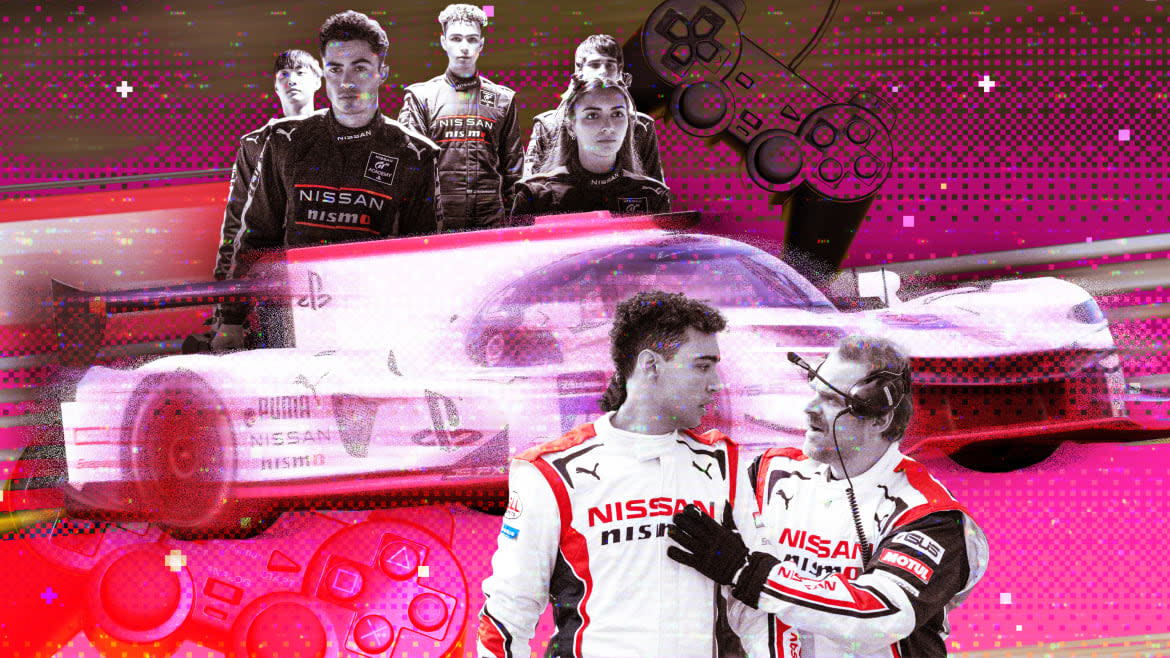How a Failed ‘Halo’ Movie Defines Neill Blomkamp’s Entire Career

- Oops!Something went wrong.Please try again later.
- Oops!Something went wrong.Please try again later.
- Oops!Something went wrong.Please try again later.
Racing fans, PlayStation junkies, Orlando Bloom loyalists: All fall within the Venn diagram of demographics courted by Gran Turismo, the new video game adaptation racing into theaters nationwide Aug. 25. What you won’t find in the inescapable advertisements for this movie is much evidence of who made it. Blink and you’ll miss his name during the official trailer, where it flashes by at Jann Mardenborough-like speed. And it’s nowhere to be found on the posters, which play up the brand, the cast, the based-on-a-true-story angle… really, everything except the fact that Gran Turismo is the newest film from the once hotly in-demand director of District 9. How far has Neill Blomkamp’s stock fallen that studios are now practically hiding his involvement with a project?
Gran Turismo is as work-for-hire as any movie Blomkamp has ever helmed, the kind of unabashed crowd-pleaser you tackle to free yourself from director jail and maybe prove to the industry that you’ve still got some hit-making fuel in the tank. A rousingly old-fashioned sports drama that doubles as a commercial for the games, the film retells the unlikely true story of how British teenager Mardenborough traded the virtual steering wheel for a real one, translating his gaming skills into an actual racing career. It’s the only feature on Blomkamp’s resume that he didn’t write himself, and there are few traces of the narrative obsessions that have defined his progressively less popular sci-fi thrillers. At a glance, you probably wouldn’t guess that this was the work of the same guy who once combined The Office, The Fly, and a dozen other disparate influences into an elaborate apartheid allegory.
Yet in at least one way, Gran Turismo also represents a kind of career culmination for Blomkamp. At last, the South African-Canadian filmmaker has fulfilled his destiny to make a video game movie! In an unofficial sense, he’s been making those all along. While folks like Paul W.S. Anderson and the infamous Uwe Boll have churned out licensed console-to-theater adaptations (many of them critically reviled), arguably no one has brought the spirit of video games to the big screen as consistently as Blomkamp. In aesthetics, in pacing, in structure, his movies betray a D-pad addiction.

Neill Blomkamp (center) and the actual Jann Mardenborough (right) on the set of Gran Turismo.
Right from the beginning, Blomkamp’s work has sat at the intersection of games and cinema. After all, he made his entrance into the industry via the doomed attempts to get a Halo movie off the ground. Hired off the strength of his work as a special effects artist and commercial director (as well as his enthusiasm for the gig—“I was genetically created to direct Halo,” he supposedly said during pre-production), Blomkamp labored for months with producer Peter Jackson on an adaptation of the Xbox franchise, only to helplessly watch as financing for the pricey project fell through. Vestiges of his vision survive in a series of Halo short films he made; eventually combined and released in 2007 as a single seven-minute movie, Halo: Landfall, they offer a kind of sci-fi Black Hawk Down in miniature, establishing Blomkamp’s interest in converting the frantic mayhem of a first-person shooter to a less interactive medium.
Blessed with Jackson’s continued involvement as producer, Blomkamp would quickly pivot to an expansion of one of his own short films, snatching victory from the jaws of defeat with a commercial, critical, and award-winning juggernaut. The success of District 9 was one hell of a consolation prize, but there’s no denying that Halo looms over it as dramatically as the film’s central special effect—that giant alien spacecraft—looms over Johannesburg. Blomkamp would even repurpose props and design elements from the aborted blockbuster, as if he were building something new from Microsoft’s code.
Set in an alternate past and present where alien refugees have come to Earth in search of aid, only to be placed in an internment camp by the South African government, District 9 remains a flavorful hodgepodge of past science-fiction visions, held together by the social conscience of its narrative. (Whether or not it’s the most optically sensitive of allegories, equating victims of apartheid to slimy space bugs, the film’s heart is mostly in the right place.) But Blomkamp can’t even commit to his found-footage gimmick—he drops it around the midway mark of the movie, when Sharlto Copley’s uncaring bureaucrat character is infected with alien DNA—much less his cerebral sci-fi aspirations. The film eventually kicks its ideas to the backseat in favor of a prolonged stretch of joystick action of a particularly Halo nature. As District 9 begins functioning like one long chase sequence, it’s almost as if you can see the director’s hand drifting back towards the Xbox controller.
This delayed, disappointing prioritizing of brawn over brains is a problem that would plague Blomkamp’s movies going forward. His consecutive follow-ups failed to match the acclaim or box office of District 9, while blatantly borrowing elements from it. 2013’s Elysium, starring a chrome-domed Matt Damon, relocated to a futuristic, pollution-choked Los Angeles, while once again putting a hunk of technology in the sky—in this case, a utopian, orbiting paradise where the wealthy have decamped. In 2015 came the widely mocked Chappie, about a cloyingly impressionable, childlike robot; it returned Blomkamp to a Johannesburg of gun-toting gangsters, urban battlegrounds, and sterile laboratories, and found him once again adopting a mockumentary framing device he’d quickly abandon.
Beyond their visual and conceptual similarities, both films follow District 9’s lead by commencing from big ideas—a future where class disparity is measured in altitude, a different future where advanced AI has fallen precariously into the hands of law enforcement—only to reduce them to window dressing once the big guns come out.
Maybe you can take the man out of the first-person shooter but not the first-person shooter out of the man. Like clockwork, District 9, Elysium, and Chappie all devolve into glorified Twitch streams. Their plots become a series of time trials, fetch quests, and boss fights, as the viewer progresses from one themed battle map—a ghetto, a laboratory, a space station—to the next. Characters don’t so much develop as level up, their arcs defined by the new gear to which they gain access: an alien arm that allows them to control a DNA-coded gun (in District 9), exo-skeleton armor that increases their stats (in Elysium). At a certain point, the moments where someone isn’t running and gunning start to look like skippable cutscenes, delivering expository information before the next gauntlet.

Matt Damon in the District 9-esque Elysium.
Blomkamp borrows with panache. Few filmmakers have better translated the visceral intensity of an online multiplayer match to the big screen, or recognized how the design elements of video games—guns, armor, battlefields—could contribute to the world-building specificity of a cinematic dystopia. His movies are, if nothing else, convincing arguments for looking to video games for cosmetic inspiration. His least-seen film, the low-budget, 2021 supernatural thriller Demonic, even draws from the pixelated unreality of games; it deliberately plays with the uncanny valley effect of imperfect graphics for scenes of its main character entering a mind-computer simulation state.
The problem, so far, is that Blomkamp’s intellectual curiosity always seems to lose out to his trigger finger. He’s yet to find a way to satisfyingly merge his intriguing, ambitious allegorical ideas with the demands of a shoot-’em-up; it always feels like he eventually turns off the promising sci-fi movie you’ve started and turns on footage of someone playing a video game based on that movie. Maybe he’s just never gotten over his failed Halo movie. Every blockbuster since has felt haunted by its slow-motion collapse, as though Blomkamp were still funneling all his scrapped concepts and scrapbook ideas for it.
‘Gran Turismo’ Review: Disastrous Movie Is Like Speed Racing in a Jalopy
To that end, Gran Turismo could be seen as a belated exorcism. Trading a hit Microsoft franchise for a Sony cash cow, Blomkamp has finally proved that he can successfully, officially translate video game action into movie spectacle. Setting aside all the actual game footage he was presumably obligated to include, the director playfully works in a lot of the visual language of driving simulators. The sometimes exhilarating race sequences cleanly, pleasingly visualize lines of potential passage on the track and digitally mark position changes. Blomkamp uses these graphical flourishes the way the Gran Turismo games themselves do, to constantly indicate how close or far Jann is from victory. But they also communicate the character’s thinking—how life and the game merge within his helmet, giving him a different perspective on racing than his competitors. The movie mimics the language of video games to show how they could rewire someone’s brain for the better.
And in a way, Gran Turismo might be Blomkamp’s best attempt to fuse video game style to traditional cinematic storytelling. That could be because it has no higher ambitions than telling a conventional, familiar rags-to-riches yarn; it lacks any pretensions of seriousness. But the film also never feels like it’s forgoing human drama when the proverbial gameplay starts. As impersonal as it may look, maybe there is something personal in the true story it tells of a player who took his talent at the controller into the real world—a journey of self-actualization to which Blomkamp, who also translated his game-related interests to another field, can surely relate. Has he finally found a way to honor his need for speed without taking his hand off the wheel of the story? If so, imagine what he could do with something more than a PlayStation infomercial.
Get the Daily Beast's biggest scoops and scandals delivered right to your inbox. Sign up now.
Stay informed and gain unlimited access to the Daily Beast's unmatched reporting. Subscribe now.

